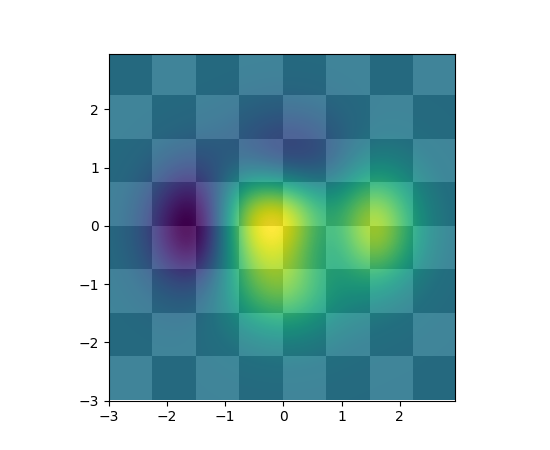
(Source code, png, pdf)

"""
Layer images above one another using alpha blending
"""
from __future__ import division
import matplotlib.pyplot as plt
import numpy as np
def func3(x, y):
return (1 - x/2 + x**5 + y**3)*np.exp(-(x**2 + y**2))
# make these smaller to increase the resolution
dx, dy = 0.05, 0.05
x = np.arange(-3.0, 3.0, dx)
y = np.arange(-3.0, 3.0, dy)
X, Y = np.meshgrid(x, y)
# when layering multiple images, the images need to have the same
# extent. This does not mean they need to have the same shape, but
# they both need to render to the same coordinate system determined by
# xmin, xmax, ymin, ymax. Note if you use different interpolations
# for the images their apparent extent could be different due to
# interpolation edge effects
xmin, xmax, ymin, ymax = np.amin(x), np.amax(x), np.amin(y), np.amax(y)
extent = xmin, xmax, ymin, ymax
fig = plt.figure(frameon=False)
Z1 = np.array(([0, 1]*4 + [1, 0]*4)*4)
Z1.shape = (8, 8) # chessboard
im1 = plt.imshow(Z1, cmap=plt.cm.gray, interpolation='nearest',
extent=extent)
plt.hold(True)
Z2 = func3(X, Y)
im2 = plt.imshow(Z2, cmap=plt.cm.viridis, alpha=.9, interpolation='bilinear',
extent=extent)
plt.show()
Keywords: python, matplotlib, pylab, example, codex (see Search examples)